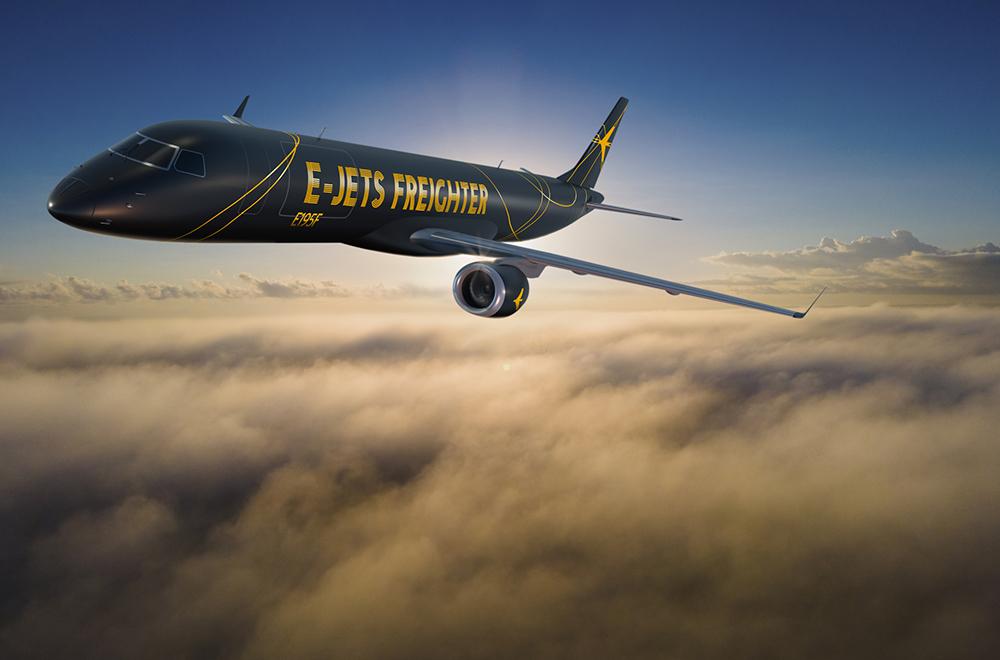
Following speculation about plans to launch an E-Jet passenger to freighter (P2F) conversion program, Embraer has officially jumped into the fray. The OEM announced that it is planning E190F and E195F P2F conversions with entry into service in early 2024. It plans to announce a launch customer before the end of 2022.
Embraer’s engineering department is currently developing a service bulletin and the OEM will perform P2F conversions at its facilities in Brazil. The conversions will include installation of a main deck front cargo door, a cargo handling system and a rigid cargo barrier, as well as floor reinforcement, air management system changes, removal of the interior and provisions for hazardous material transportation. It says the E190F will have a maximum payload of 23,600 lb. and the E195F will have a maximum payload of 27,100 lb.
According to Embraer Commercial Aviation President and CEO Arjan Meijer, the E-Jet is “perfectly positioned to fill the gap in the freighter market between turboprops and larger narrowbody jets.” The OEM notes that it sees a market of approximately 700 aircraft of this size over the next 20 years.
Embraer says the P2F conversion will be available for all pre-owned E190 and E195 aircraft. According to Aviation Week’s Fleet and MRO Forecast, there are currently 633 E190 and E195 aircraft in service, with the largest percentage (about 27%) being operated in Western Europe, followed by Latin America (about 21%) and North America (about 15.5%).
According to the OEM, the E-Jet P2F conversions will address several opportunities within the cargo market. It notes that earlier E-Jets that entered service 10-15 years ago are reaching the end of their long-term leases and beginning their replacement cycle, so the full cargo conversion will extend the life of the most mature E-Jets by another 10-15 years. Aviation Week Fleet and MRO Forecast data shows that approximately 84% of the E190 and E195s currently in service are 10 or more years old.
“The E-Jet air freighters will provide fast, reliable and cost-effective services to freight forwarders, extend the revenue earning life of E-Jets, support E-Jets’ asset values and create a strong business case encouraging the replacement of earlier aircraft with modern, more efficient passenger aircraft,” says Johann Bordais, President and CEO of Embraer Services and Support.
Embraer also argues that the E-Jet platform will have benefits over small narrowbody freighter airframes. In a press statement, it noted that “current small narrowbody freighter airframes are aged, inefficient, highly polluting and well within their retirement window.” According to Embraer, its E-Jet P2F conversions will have “over 50% more volume capacity, three times the range of large cargo turboprops and up to 30% lower operating costs than narrowbodies.” It also notes that E-Jet freighters will be well suited for same day deliveries and decentralized operations.
Although Embraer has only announced plans to pursue cargo conversions for the E190 and E195 platforms, a representative for the OEM says there could be future developments for the E170 and E175, depending on market trends and opportunities.
“With more than 1,600 E-Jets delivered globally, customers of this new freighter segment will benefit from [a] well established, mature global services network, in addition to a comprehensive portfolio of products ready to support their operation from day one,” says Bordais.
Aviation Week’s Fleet and MRO Forecast shows total MRO demand of $1.2 billion in 2022 for the E190 and E195. Including the E170 and E175, the E-Jet family accounts for $2.6 billion in total MRO demand.




